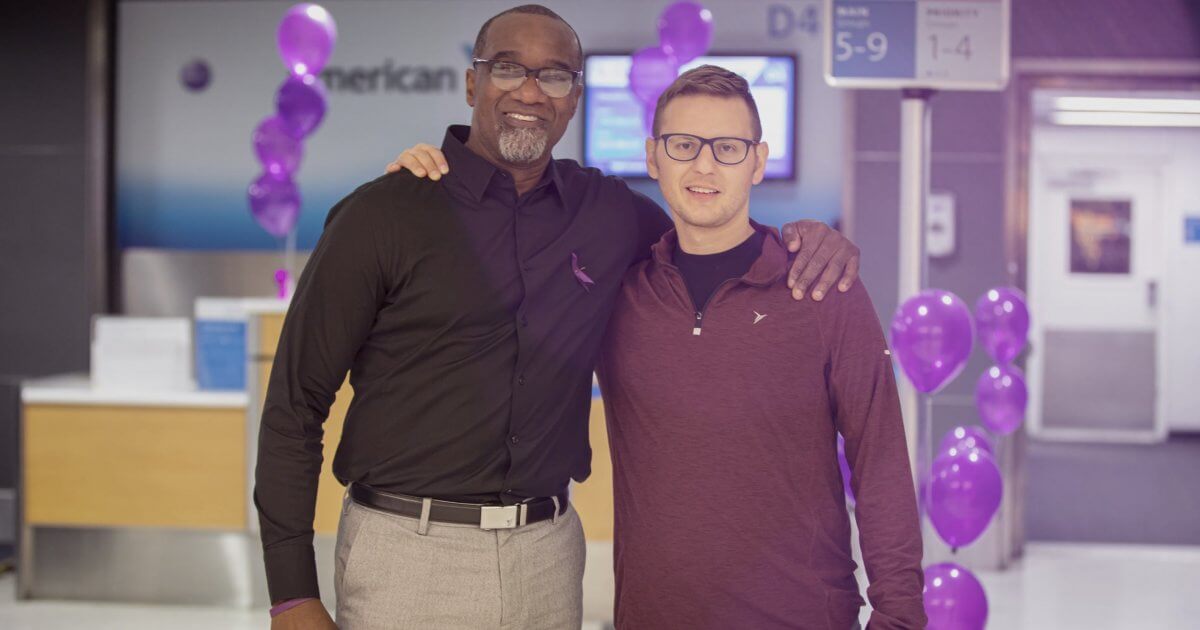When American Airlines employee Craig Irving met cancer survivor Adam Deal, he was blown away by their bond, one that would grow and help Deal in an unexpected way: Free miles to get Deal the treatment that he needs.
“I truly believe Adam and I were meant to be brothers,” Irving told SurvivorNet in an email.
Read MoreIrving, who lives in Washington, D.C., became active in raising awareness after she died. But when his mom passed away, he said, he lost the energy he needed to continue.
“At the summit we all had to share why we were there and when I heard Adam's story, and that he is a survivor, it became clear I was exactly where I belonged,” Irving tells SurvivorNet. “When I got back to D.C. after the Summit, I reached out to Adam on Facebook and told him he gave me my 'why' back!”
A Long Trip for Treatment
Irving says he told his colleagues about his new friend, and how he lives in Cleveland but flies to New York every few weeks for chemotherapy. Beyond the taxing effects of the treatment, the journey is also costly. So Irving and his colleagues hatched a plan: They would pool together their miles and donate them to Deal.
A few months after the conference, when the two realized they would both be in New York at the same time, they planned to meet. What Deal didn’t know is that Irving’s colleagues — approximately 60 of them — would be with him as well. Nor or course, did he know he’d be receiving the gift of a lifetime.
Related: The Amazing Strength of Alex Trebek a Look Back at the Cancer Survivor's Jam-Packed 2019
“I made a banner to let him know that my American Airlines colleagues and I support him like they supported me when I went through pancreatic cancer with my sister,” says Irving. “It was an amazing surprise. It's a day I'll never forget.”
Pancreatic Cancer
According to the American Cancer Society, about 57,600 people will be diagnosed with pancreatic cancer this year alone and about 47,050 people will also die of pancreatic cancera heartbreaking percentage.
“Because the pancreas is inside the abdomen, it often doesn’t have symptoms that would tell you that something is wrong with your pancreas,” Dr. Anirban Maitra at MD Anderson Cancer Center told SurvivorNet in a previous conversation.
“By the time individuals walk into the clinic with symptoms like jaundice, weight loss, back pain, or diabetes, it’s often very late in the stage of the disease,” he said.
Dr. Anirban Maitra discussing the importance of detecting pancreatic cancer early
Unfortunately, most will die from this disease within a few months to a year or so from the diagnosis,” Dr. Maitra said. “The reason for that is that most individuals, about 80%, will actually present with what we called advanced disease, which means that the cancer has either spread beyond the pancreas or into other organs like the liver, and so you cannot take it out with surgeries.” He reports that only 20% of people diagnosed are candidates for surgery.
Related: New Harvard Research Finds A Chemical In Cannabis Can Help Fight Pancreatic Cancer
Currently the treatments available for stage 4 pancreatic cancer work to an extent but don’t have the desired impact. Another reason that pancreatic cancer tumors are so tough to treat is that they are often surrounded by a barrier called a "stroma."
As Dr. Allyson Ocean, a medical oncologist at Weill Cornell Medical Center, previously told SurvivorNet, "The stroma serves as a barrier for medications to get into the cancer to kill it. … So chemotherapies have a hard time getting in, radiation has a hard time penetrating." New research is hoping to change this in the near future.
Learn more about SurvivorNet's rigorous medical review process.


